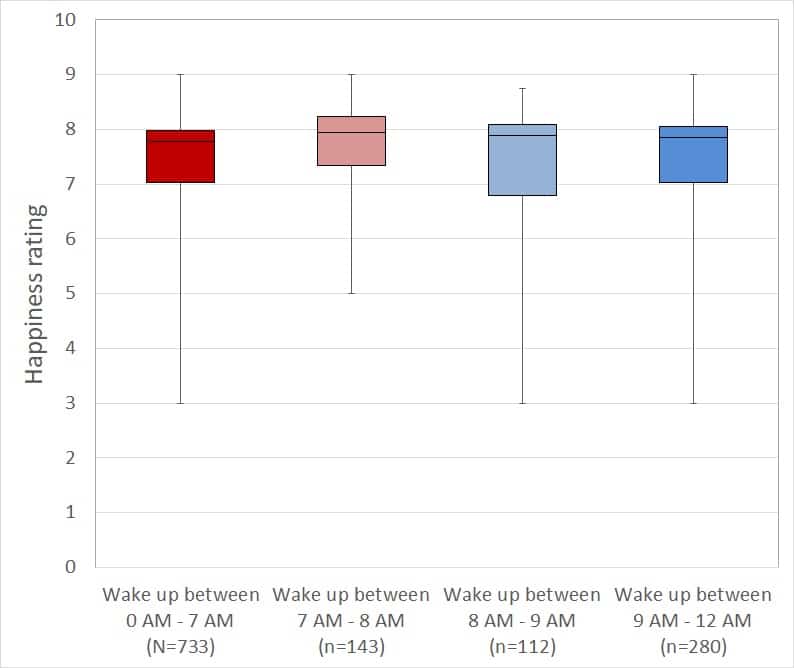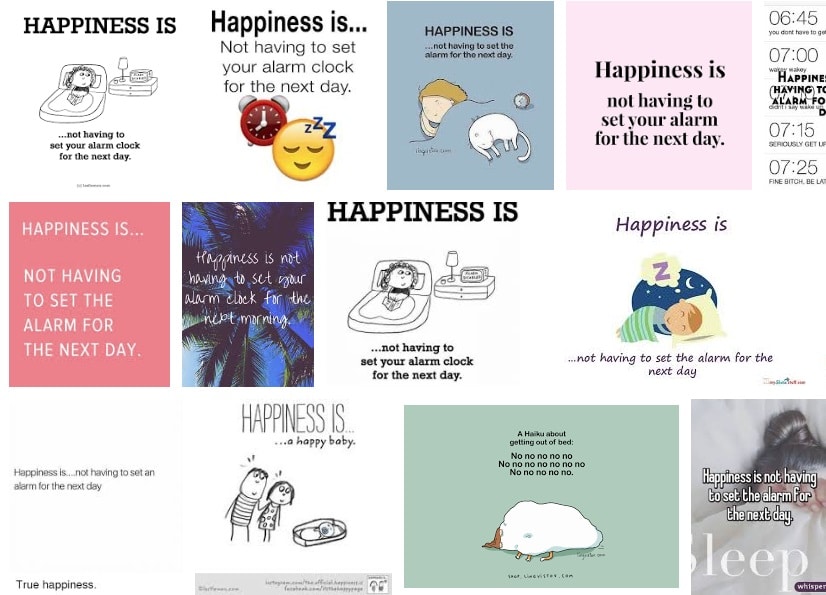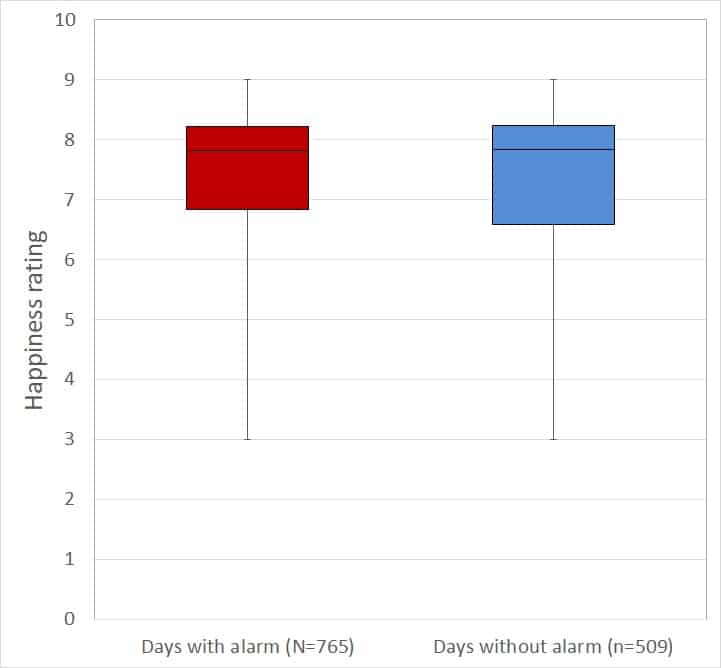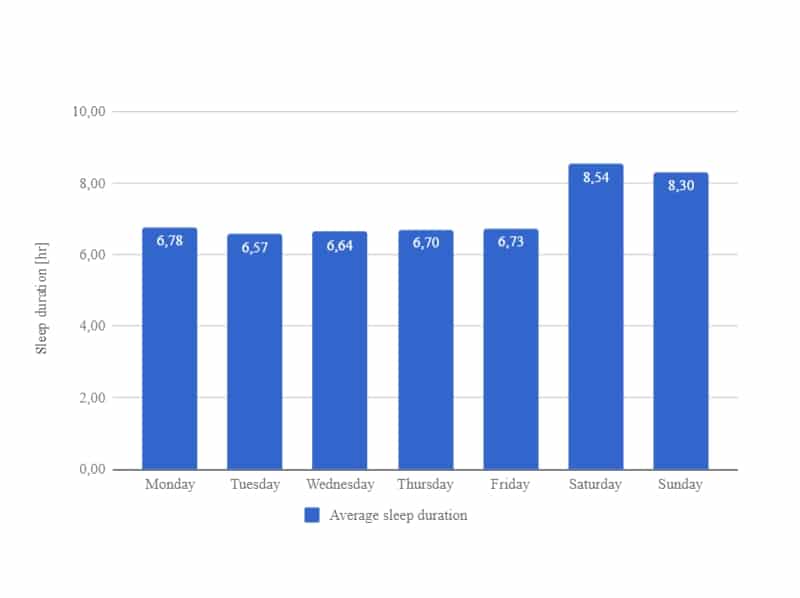Ever since I published the biggest study on personal happiness and sleep deprivation, I have started to ask myself a lot of follow-up questions. Sleep is becoming one of the most important happiness factors for me, which is why I want to do everything I can to understand and control it more.
And that’s what I plan to do in this post. In this follow-up study on personal happiness data and sleep, I embark on a journey to find out if waking up early has an effect on my happiness. I want to find out if there’s a way for me to have happy mornings for the rest of my life.
I have analyzed my data and come to the conclusion that I need to wake up between 7 and 8 AM in order to be happy. It’s one of the many observations that I’ve been able to make by analyzing this early morning happiness data.
Contents
Introduction
As much as sleep has been studied already, it still is one of the most uncharted areas of science. Meanings tend to vary wildly depending on which source you consult. Some journals state that sleep deprivation can actually cure depression. How about that?
I beg to differ.
According to my analysis, sleep deprivation has never resulted in a happier day for me. In fact, sleep deprivation tends to increase the likelihood that I experience a bad day.
I came to this conclusion – and many others – after analyzing about 1,000 days of my personal happiness and sleep data.
What I want to find out next is not related to sleep deprivation. I want to see if waking up early has any correlation to my happiness. Related: the biggest study on personal happiness and sleep deprivation
Early mornings result in happy mornings?
You’ve probably heard it before: waking up early allows one to be more productive and energized. There’s a ton of listicles that claim billionaires are successful because they wake up early. Therefore, you are an idiot if you don’t prioritize waking up early. How can you ever be successful or happy if you don’t get used to waking up early?
This is, of course, something that generates my interest.
I have all the data that I need in order to test this thesis. And so that’s my goal for this follow-up post: I want to find out if waking up early does, in fact, correlate to an increased level of happiness.
Tracking happiness
For those who are new here: I track my happiness every single day, and I’ve been doing so for the last 5 years. I rate my happiness every day on a scale from 1 to 10, which is part of my happiness tracking method. I can use this vast amount of data to find out exactly how I can actively steer my life in the best direction possible.
The topic of today’s analysis is my sleep. If I can find out whether or not waking up early is correlated to my happiness, I can use that knowledge to become happier in general.
Analyzing my sleep data
If you haven’t already read my original study on my personal sleep and happiness data, I suggest you take a minute to scan through it.
If you’re lazy (like me), then here’s a TLDR of that article:
I’ve analyzed 1,000 nights of sleep using an app called SleepAsAndroid, which measures my sleep duration and quality every single night. I’ve used the data from this app to correlate sleep deprivation to my happiness. The result is quite obvious. Sleep deprivation does not directly result in an immediate decrease in happiness, but it does tend to do so indirectly. All of my worst days have occurred while being significantly sleep-deprived.
Another observation from this analysis is that my sleep schedule is quite wacky.
I am quite the office slave, and this chart confirms it. I wake up every morning on weekdays to get my ass in the office. As a direct result, I tend to sacrifice my sweet amount of sleep in order to avoid the rush hour. You can see how that affects my rhythm. I need to catch up on my sleep deprivation just about every single weekend. As a result, I am constantly living on social jetlag.
Those are quite some interesting observations already, which is why I really recommend you use an app like this.
Wakey wakey
Conveniently, I also use this app as an alarm. In addition to a lot of handy features – such as smart alarms and measures to prevent oversleeping – this app also stores my wake-up and alarm times!
This is just the data I need.
As I said before, I am quite a slave to the daily rat race. My commute covers one of the shittiest, most accident-prone highway stretches of the Netherlands. This is why I try to get in the office BEFORE the rush hour starts.
This is why I set my alarms at 6:00 AM on weekdays.
I am quite the robot in the early mornings. What I mean by that is that I have a strict morning routine. I prepare my breakfast and lunch the night before, just like my shower. My alarm goes at 6:00. I almost ALWAYS snooze for 5 more minutes (I’m weak). I then get up, clean up, get dressed, grab my food and start my engine. This way, I’m usually out of the door at 6:20. If traffic is kind to me, I’ll be in the office before 7:00 AM.
This morning routine is visualized quite nicely in the following graph. Please note that this graph is scrollable!
This graph shows every single day in which I tracked my sleep and wake-up times. It shows you everything you need to know about my sleep.
At first glance, you’ll probably notice how my alarm goes at 6:00 AM on most weekdays, and that I allow my alarm to snooze for about 5-10 minutes each morning.
You’ll also notice that there are some gaps in the dataset, which means that I was either on holiday and unable to track my sleep, or I simply forgot.
And finally, you can probably see my wacky rhythm of stacking up sleep deprivation on weekdays, only to recover on the weekends. As I said before, this is a clear case of social jetlag.
I obviously don’t set my alarms on weekends, as my weekends are sacred to me. I wouldn’t want to miss my free Saturday and Sunday mornings for the world, and I do my best to AVOID any reason to set an alarm on the weekend days. It is my objective to recover from sleep deprivation during the weekends.
On the rare occasion that I fail in my objective, you can safely assume that there was nothing I could do about it…
Anyway, that’s not the point of this analysis. I want to find out whether or not waking up early results in happier mornings.
And for that, I need to add my happiness ratings to this analysis.
Happy mornings?
As said before, I have tracked my happiness every single day for the past 5 years. I have used these happiness ratings – in combination with the data in the previous graph – to create the following scatter chart.
This graph shows all the 1,274 days of data that I’ve tracked. I started tracking my sleep in March 2015, and I’ve missed a couple of days, but it is still quite a bit of data to present.
I’ve also highlighted the mornings in which I was woken up by an alarm in red.
This chart should be able to show me any correlation between waking up early and being happy.
But as you can see, it’s pretty hard to notice any trend going on.
What’s funny about this chart is that the bulk of my alarms are centered around the 6 AM point. This wake-up time has really settled in my mind, as I sometimes even wake up minutes before 6:00 AM without even requiring my alarm!
What’s even funnier though is that I apparently needed an alarm to wake me up at 10:28 AM on the 26th of December 2016! What a mess…
Anyway, the reason why I think it’s hard to notice any correlation in this dataset is because my happiness ratings are influenced by a virtually endless list of other happiness factors!
My daily happiness ratings are a result of much more than just my wake-up times. Just have a look at the happiness factors that have influenced my happiness before. All of these happiness factors could be distorting the correlation that I’m trying to test in this analysis.
Therefore, I need to look more closely at the data that I have.
How waking up early influences my happiness
An arguably better method to plot a selection of scattered data points is via a box plot. I have created the following box plot in order to show whether or not waking up early has an influence on my happiness.

This shows the same data as the previous scatter plot but is now divided into 4 bins (boxes).
What you can see from this box plot is that my average happiness rating is the highest when I wake up between 7 and 8 AM.
Not only is the average higher, but also the rest of the distribution of happiness ratings.
Sure, the difference may look pretty small to you, but it cannot be denied that I tend to be happier on days when I wake up between 7 and 8 AM.
And that small difference looks pretty significant to me. Why? Because I know how much my happiness ratings are influenced by other happiness factors.
Sleeping in does not make me happy?
What’s also interesting is that sleeping in doesn’t seem to have a positive influence on my happiness. And that sounds pretty counter-intuitive to me.
You would say that sleeping in makes me pretty happy, especially since I usually look forward to not having to wake up with an alarm on the weekends.
Then why does my data not confirm this?
It might be because sleeping in means that my days are shorter.
Don’t believe me? Here’s a chart showing how much time I spent awake versus how early I wake up in the morning.
This data shows that I spent more time awake when I wake up early. The correlation is pretty significant and clear from this data.
This is basically a result of my tendency to build up sleep deprivation during the weekdays and recovering by sleeping in on the weekends. Even though my wake-up times vary wildly, my go-to-sleep times remain quite consistent, usually between 11 and 12 PM.
But let’s get back to my busted prediction: why does sleeping in not have a positive influence on my happiness?
This is closely related to the sleep dilemma that I discussed in part 1 of this sleep analysis. Let me refresh your memory.
The dilemma of sleep and happiness
We become and stay happy by being awake, doing things we enjoy doing. Therefore, it’s safe to say that our happiness ratings can only increase when we are awake. You see where this is going?
You may decide to sacrifice your sleep for the sake of spending more time on things you like. That’s what I have certainly done in the past. I did it rather successfully while traveling in New Zealand: I chose to temporarily reduce my sleep duration because I wanted to travel more. I also spectacularly failed in this regard, when I had my worst day ever while burning out in Kuwait.
Somewhere between these two examples lies an optimum. And we should all try to pursue this optimum. We all want to stay awake as long as possible, to enjoy the things we enjoy doing. But we don’t want to shoot ourselves in the foot by becoming seriously sleep-deprived. And that is the dilemma of sleep and happiness.
What I am trying to say here is that we need to be awake in order to do things we enjoy. So, therefore, spending more time awake allows us to spend more time to pursue happiness.
This is why sleeping in might not result in a higher happiness rating. On average, I spend less time awake after sleeping in, which keeps me from doing things I enjoy doing.
But what about work?
If you are keen on details, you might recount that I’m an office slave. I said so myself!
So even though I often wake up early at 6:00 AM and spend more time awake on a weekday, I still have to spend most of it inside an office. And surely, that cannot have a positive effect on my happiness, right?
Well, as I’ve analyzed before, my work doesn’t have that much of a negative effect on my happiness! In fact, I sometimes actually enjoy working!
In addition, waking up early and spending my time in the office often gives me a sense of purpose and productivity.
And those are all feelings that have a huge indirect effect on my happiness rating.
Early mornings are happy mornings
Remember those articles that I mentioned at the start of this post, claiming that all billionaires have made it a habit to wake up early?
Well, I believe now there is some truth to those articles, even though these articles have quite a high clickbait factor. I feel like waking up early allows me to be more productive and adds a sense of purpose or meaning to my day.
And that is reflected by my happiness ratings.
What about my alarm?
Some of you might have seen the typical “Happiness is….” quotes.
Some well-known examples:
Happiness is…
…. seeing your dog after a long time away.
…. spending time with loved ones.
…. doing something stupid and laughing about it for weeks.
…. getting a message from someone you love.
But you might have also heard of this one: “Happiness is not having to set your alarm clock for the next day.“

Obviously, I want to test this quote as well, since I have all the data.
Correlating happiness to my alarm clock
I’ve created the box plot below, showing my happiness ratings on days with and without an alarm.

Before I created this chart, I was expecting that waking up with an alarm would have a negative effect on my happiness.
But it turns out that isn’t the case.
Waking up with an alarm seems to not have an influence on my happiness ratings at all. The average happiness rating on days without an alarm is only 0.02 higher than days with an alarm (7.83 versus 7.81).
So the next time I am small-talking with my colleagues and the topic of “happiness is not having to set an alarm” comes up, I’ll say:
No, that’s FALSE, because I analyzed 1,274 days of my happiness ratings and sleep data and it turns out that I am not happier on days where I’m not woken up by an alarm! Here’s the data to support this statement! *points at graphs*
But all joking aside, what am I really going to do now I know all this?
Not much, really. I will still wake up at most weekdays at 6:00 AM in order to avoid the rush hour, and I’ll still continue to use weekends for sleeping in.
However, I am going to try to go to bed earlier during the weekdays (something that I find very hard). This will allow me to reduce my sleep deprivation at the end of the week, which might result in me waking up earlier on the weekends without having to set an alarm!
Some additional points to consider
- It might not be a coincidence that I’m happiest when waking up between 7 and 8 AM since that is basically the natural rhythm of human beings. All living beings are in sync with the sun, so it seems logical that we are happiest when we are completely in sync. This gives me another idea: how much does my sleep pattern match the rhythm of the sun, and how does this influence my happiness.
- It could very well be that my wake-up times are just a proxy in this analysis. There’s a big list of happiness factors that could have a far bigger influence on my happiness than just my wake-up times. Just an example: when I’m sick, I won’t wake up early to go to work and I usually sleep in. In this case, my happiness is much, much more affected by my sickness than my wake-up time. Waking up early could just as well be a proxy for another happiness factor that I’m not yet recognizing. Think about work in the office, holidays, days-of, sick days, weekend days and practically everything else as a distortion to this analysis.
- I create a case that spending more time awake allows me to spend more time doing things I like, which is why I might be happier when I wake up early. But I have not yet analyzed this thesis as much as it deserves. I’ll leave that to another one of my research posts!
💡 By the way: If you want to start feeling better and more productive, I’ve condensed the information of 100’s of our articles into a 10-step mental health cheat sheet here. 👇
This Cheat Sheet Will Help You Be Happier and More Productive
Thrive under stress and crush your goals with these 10 unique tips for your mental health.
Closing words
Sleep remains one of my biggest happiness factors, and I still have a long way to understanding it completely. With any luck, I’ll be able to improve my sleep rhythm in such a way that I can actually use it to become happier.
I now have a vague idea of how to get there! 🙂
Now I want to hear from YOU!
What do you think about this analysis? Did it inspire you to think differently about your own sleep rhythm? Do you disagree with me and feel like alarm clocks are the purest evil on this planet?
If you have any questions about anything, please let me know in the comments below, and I’ll be happy to answer!
Cheers!



Interesting stuff. I’ve read in a few places that sleeping the same hours consistently is really beneficial to sleep quality. So you might try analyzing how far off a night is from your overall average, to see if that comes out true in your own data set.
This is a brilliant idea, I hadn’t thought of that. I will definitely have to write another analysis on sleep habits. There are so many interesting angles to look at. Thanks for the comment Jeoff!